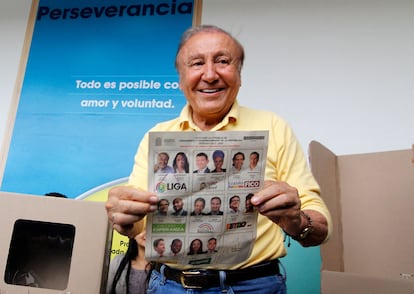Rodolfo Hernández, the populist earthquake shaking up the Colombian election
His victory over Federico Gutiérrez leaves the Uribismo movement without a candidate and complicates a comfortable victory for Gustavo Petro in the runoff


In less than three weeks, Rodolfo Hernández has moved the tectonic plates of Colombia’s presidential election. The millionaire engineer has sneaked into the second round, where he will face off with the leftist Gustavo Petro. Not only has this left Federico Gutiérrez, the right-wing candidate, out of the race, but it also makes victory more complicated for Petro, who was the unbeatable leader in the polls for months.
Hernández is a 77-year-old builder who was mayor of Bucaramanga, a city located in the east of the country. Politically he is an enigma due to his positions and his populist rhetoric. He made a name for himself with a simple message attacking the corrupt elites that went down very well among citizens fed up with traditional politics. With his irreverent outings and character, he became the anti-establishment candidate, even more so than Petro, who had been viewed as one for years.
He is known for statements affirming that he admired Adolf Hitler, although he later said that it was a slip of the tongue and that he was thinking of Einstein; he is also on record with misogynistic and xenophobic remarks about female Venezuelan migrants. Hernández is remembered in Bucaramanga for having slapped an opposition councilor and for a case of alleged irregularities in the contracting of waste removal services.
Petro’s contender has so far avoided debates and, instead, speaks directly to his voters through social media, where he is known as “the old man of Tik Tok.” Through these platforms, he has made populist proposals such as building low-cost housing for all Colombians, or erecting a citadel in the middle of the countryside for prisoners. He has also promised “major budget cuts,” eliminating the use of presidential planes and helicopters and donating all the money he receives as president.
He has also said that he will eliminate embassies and government departments focusing on women’s affairs, take away congress members’ vehicles and force lower salaries on advisers to legislative units, pledges that have earned him the favor of his voters.
With Fico Gutiérrez out of the race, one of the questions is whether the votes of the right and, specifically, of Uribismo, will go to the former mayor. What this first round does make clear is that, for the first time in decades, former President Álvaro Uribe does not have a candidate from his party. Uribe has been the great missing element in these elections, at least publicly. His legal troubles have undermined his popularity and the mismanagement of his political godson, the current President Iván Duque, has left his party in a very bad political position.
Hernández has said on other occasions that he is a friend of Uribe and that the former president has helped him, although it is not known exactly how. They also resemble each other in their upfront style and the idea that they speak from the regions. When Uribe burst onto the Bogotá scene, he did so in defiance of the centralist elite that had always ruled the country. He presented himself as a politician with a regional vision, like Rodolfo. But the former mayor of Bucaramanga also represents voters from intermediate cities. During the campaign, he focused his efforts on the cities such as Neiva and Villavicencio.
But Hernández’s victory in this first round also means trouble for Gustavo Petro’s campaign, for the first time. The leftist candidate will have to show that the discontent evidenced in the social outbreak of 2021 is stronger than the weariness with corruption that the millionaire from Bucaramanga is building his campaign on.
Tu suscripción se está usando en otro dispositivo
¿Quieres añadir otro usuario a tu suscripción?
Si continúas leyendo en este dispositivo, no se podrá leer en el otro.
FlechaTu suscripción se está usando en otro dispositivo y solo puedes acceder a EL PAÍS desde un dispositivo a la vez.
Si quieres compartir tu cuenta, cambia tu suscripción a la modalidad Premium, así podrás añadir otro usuario. Cada uno accederá con su propia cuenta de email, lo que os permitirá personalizar vuestra experiencia en EL PAÍS.
¿Tienes una suscripción de empresa? Accede aquí para contratar más cuentas.
En el caso de no saber quién está usando tu cuenta, te recomendamos cambiar tu contraseña aquí.
Si decides continuar compartiendo tu cuenta, este mensaje se mostrará en tu dispositivo y en el de la otra persona que está usando tu cuenta de forma indefinida, afectando a tu experiencia de lectura. Puedes consultar aquí los términos y condiciones de la suscripción digital.








































